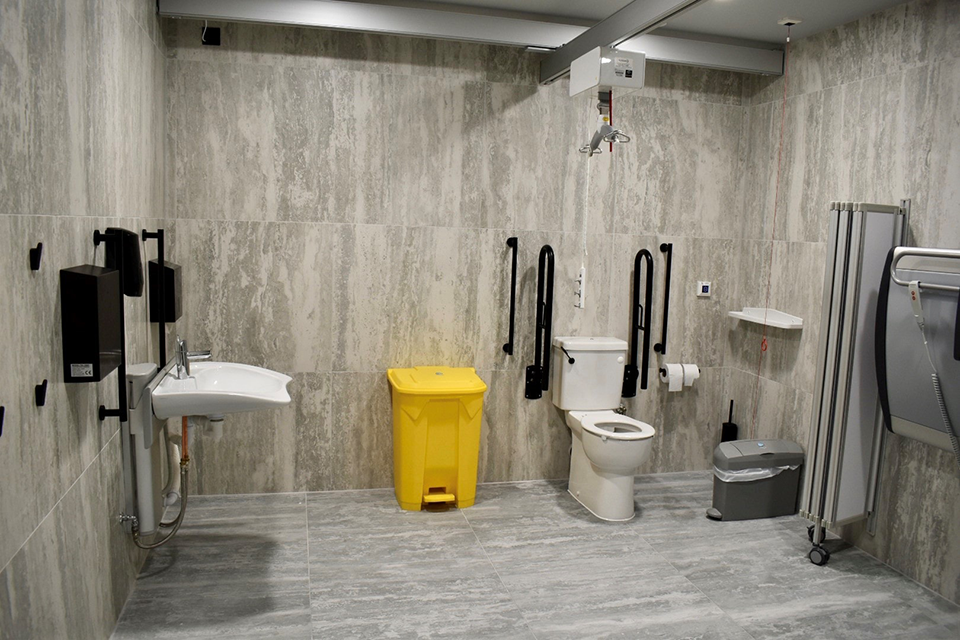
11:46 AM, 28th March 2022, About 3 years ago 1
Text Size
Thousands of severely disabled people who need specialised facilities when they are out and about will benefit from over 500 new Changing Places toilets in England.
The Chancellor confirmed in his Spring Statement over £23.5 million has been allocated to 191 councils across England to install life-enhancing Changing Places toilets in public places and tourist attractions, dramatically increasing accessibility in areas where users want them most.
There are currently just over 1,300 registered Changing Places toilets in England – these are larger accessible toilets for people who cannot use standard accessible toilets, with equipment such as hoists, curtains, adult-sized changing benches, and space for carers. Today’s package will bring the total number of Changing Places toilets to 1,813.
An additional £6.5 million will be allocated in a further round later in 2022 and will focus on areas where there is little or no access to Changing Places toilets.
Ministerial Disability Champion Eddie Hughes MP said: “It goes without saying that people with severe disabilities, their families and carers should be able to go shopping, plan a day out or travel without needing to worry about whether they will have access to suitable toilet facilities.
“I am delighted that our funding today will help provide over 500 new Changing Places Toilets in England, enabling people to enjoy everything their local area has to offer with dignity and freedom.”
In a study by the Research Institute for Disabled Consumers in 2021 families and carers said the top locations where these facilities should be made available were country parks, open spaces, tourist attractions and transport networks, as the journey to the destination is a key factor in planning a day out. The top venues were beaches and the seaside, motorway services and parks or gardens.
New facilities will now be built in the following venues:
Sarah Rennie, 36, is an accessibility consultant, specialising in transport from Birmingham. She has a muscle wasting condition, cannot walk and is a wheelchair user. She is supported by a personal assistant to use a hoist and access facilities in Changing Places toilets.
She said: “I can’t use typical accessible toilets because, without a hoist or changing bench, I can’t get from my wheelchair onto the toilet. This means that all too often, if I’m working in another city, attending a hospital appointment, or going to a festival, I can expect to wait 12 hours without accessing a toilet. This can make me feel ill and be quite painful.
“Changing Places toilets offer me – and my assistant – a safe and dignified alternative. It’s such a relief to know that there will be more of these throughout England which gives me a better chance to find a loo I can use and go about my day like everyone else.”
Muscular Dystrophy UK co-chairs the Changing Places consortium and has been heavily involved throughout this process. The charity will be providing specialist expertise to support local councils that are awarded funding. This expertise will include:
Robert Burley, Director of Care, Communications and Support at Muscular Dystrophy UK, said: “Today’s announcement is life-changing news for the thousands of people and families who rely on Changing Places toilets when they are in public, because being able to use a toilet that is suitable for your needs is a basic human right.
“We’ve provided specialist support to the Levelling Up department throughout this process, and we’re really pleased that local authorities will soon be told the outcome of their application.
“We look forward to supporting councils that have been awarded the funding with their Changing Places toilet installations, because they really do make a world of difference to those who depend on them.”
Further information
In the absence of Changing Places toilets, disabled people and/or carers face:
The Changing Places Consortium
Launched its campaign in 2006 on behalf of the over 250,000 people across the UK who cannot use standard accessible toilets. This includes people with profound and multiple learning disabilities, motor neurone disease, multiple sclerosis, cerebral palsy, as well as older people.
There are 13.9 million disabled people in the UK. People with profound and multiple learning disabilities, as well people with other physical disabilities often need equipment and space to allow them to use the toilets safely and comfortably. With a lack of CPTs, many people are effectively excluded from participating in the fuller life available to the rest of society.
Blodwyn
Become a Member
If you login or become a member you can view this members profile, comments, posts and send them messages!
Sign Up13:06 PM, 28th March 2022, About 3 years ago
Check yours in one of the councils affected then chase chase chase!